A woman, whose husband had recently been released from jail after serving time for spreading pro-democracy material, is hit by a car -- believed to be driven and occupied by plainclothes police officers -- in an effort to intimidate her and prevent her from meeting with the U.S. Ambassador. A lawyer who travels to the U.S. to serve as a Fellow at the National Endowment for Democracy is arrested within a week of his return home, and charged with engaging in activities aimed at overthrowing the government.
While these stories sound like they were lifted from the files of the KGB, they are, in reality, all events that have recently taken place in Vietnam.
Each event, while outrageous and appalling, is also regrettably predictable. Vietnam claims to have put an end to human rights abuses, but its so-called reforms have turned out to be nothing more than smoke and mirrors. The Vietnamese government continues to carry out human rights abuses with impunity.
 Earlier this week, the U.S. House of Representatives passed a resolution we sponsored to once again insist that the government of Vietnam stop playing games with human rights. Our resolution calls on the Socialist Republic of Vietnam to immediately and unconditionally release all political prisoners and prisoners of conscience who have been arrested in a recent wave of government oppression.
Earlier this week, the U.S. House of Representatives passed a resolution we sponsored to once again insist that the government of Vietnam stop playing games with human rights. Our resolution calls on the Socialist Republic of Vietnam to immediately and unconditionally release all political prisoners and prisoners of conscience who have been arrested in a recent wave of government oppression.That includes Father Nguyen Van Ly, the aforementioned Catholic priest, who was sentenced to eight years in prison merely for attempting to exercise his fundamental human right of peacefully advocating for change in Vietnam. Father Ly's kangaroo court proceedings were over before they started. Given no defense lawyer, he was left to fend for himself in a courtroom where his guilt was predetermined and his mouth muzzled as he attempted to stand up for his rights.
He is not alone. Around the same time Father Ly was hauled in, Vietnamese police arrested the principal spokesperson for the Vietnam Progression Party and the founder of the Vietnamese Labor Movement, Le Thi Cong Nhan. On the same day Father Ly was arrested -- March 6, 2007 -- Vietnamese police arrested one of Vietnam's few practicing human rights lawyers, Nguyen Van Dai.
Along with the disgraceful attempts to silence political opposition, the regime in Hanoi continues to repress religious freedom and persecute members of the Cao Dai religion, the Unified Buddhist Church of Vietnam, Hoa Hao Buddhists and the Montagnards from the Central Highlands. Labor rights are nearly non-existent and the Vietnamese government has made little to no progress in ending the horrific crime of human trafficking in their country.
The conviction of Father Ly and the arrests of Mr. Dai and Ms. Nhan violate Article 69 of the Vietnamese Constitution and are in contravention of the rights enshrined in the International Covenant on Civil and Political Rights (ICCPR), to which Vietnam is a state party. Father Ly and the other dissidents merely want a better future for their country. They are smart, talented and kind people -- some of Vietnam's best, brightest and bravest. They harbor no malice toward, and have in no way advocated violence against, the Vietnamese government.
Much like Vaclav Havel, Lech Walesa and other champions of democracy who helped bring about the peaceful end of communism in Eastern Europe, these individuals are heroes. They and their families are consistently harassed, persecuted and, in many cases, incarcerated and tortured solely because they advocate for a Vietnam where they and their countrymen can speak freely, vote in free and fair elections, and practice their faith.
Tyranny hates and fears public exposure, so we must keep attention focused like a laser beam on Vietnam's ongoing human rights violations. The U.S. House of Representatives has vigorously called for reform through passage of our resolution, giving a voice to the dissidents in Vietnam who continue to be silenced by the regime, and demanding that the government of Vietnam complies with internationally recognized standards for basic freedoms and human rights. The international community -- especially Vietnam's neighbors and trading partners -- should follow suit with a similar resolution to bring pressure to bear on the regime.
When Vietnam joined the World Trade Organization (WTO) in 2006, membership was granted in light of assurances that the Vietnamese government was steadily improving its human rights record and would continue to do so. This recent crackdown is a significant step backward. The norms and responsibilities of joining the international community do not end with WTO membership. Rather, a constant commitment to protecting and promoting human rights should be required of all member states. If Vietnam's leaders are unwilling to live up to the obligations of WTO membership, then they are undeserving of the benefits that come from it.
Human rights are central -- and must be at the absolute core of our relationship with any government. Vietnam shouldn't be an exception.
The authors are members of the U.S. House of Representatives. Mr. Smith is a Republican of New Jersey; Mr. Stupak is a Democrat of Michigan; Mr. Wolf is a Republican of Virginia.

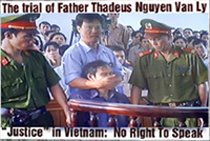
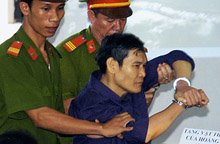
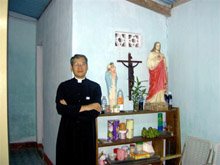


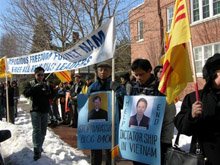




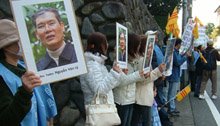
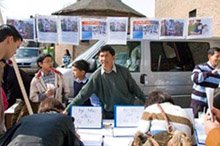


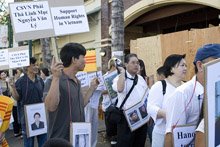
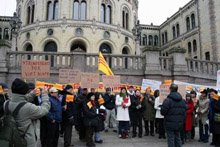
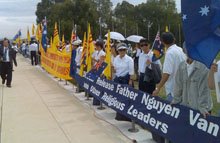




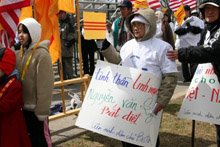
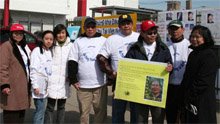
No comments:
Post a Comment